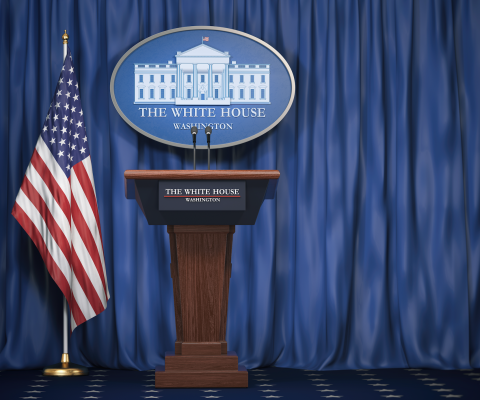The 2024 Presidential Election: Where Candidates Stand on Tech
January 2, 2024The 2024 U.S. Presidential election promises to be a fascinating intersection of politics and technology, with the two deeply intertwined in ways we haven't fully seen before. Of significant importance is where both the Democratic and Republican parties, as well as their leading candidates, stand on the most pressing issues facing technology and its users.
With the election less than one year away, here’s a high-level look at the current landscape.
Visions for Tech
Generally, the smaller Democratic field of candidates has emphasized issues like the ethical development and use of artificial intelligence, data privacy protections, and regulating social media to combat misinformation. In September 2022, the administration for President Joe Biden released six principles that guide its policy work in tech, which include specific focuses on limiting tech companies’ monopolies, enhancing privacy regulations, and strengthening children’s online safety. Minnesota Representative Dean Phillips and author and political activist Marianne Williamson, the two other candidates who have formally announced their candidacy, have been similarly vocal about breaking up tech monopolies and using technology for social good, like expanding access to broadband and closing the digital divide.
Republican candidates have focused more on concerns about censorship on social media, promoting free speech, and leveraging technology for improved national security. Candidates like Florida Governor Ron DeSantis have called for less government intervention in tech while pushing for innovation in areas like space exploration, cybersecurity preparedness, and defense technology. DeSantis and biotech entrepreneur Vivek Ramaswamy have respectively stated plans to eliminate the Department of Energy, which builds many of the supercomputers used by academics and businesses to conduct research, and cutting the federal workforce by as much as 75%.
According to political analysts, former President Donald Trump's stance on technology, however, is more complex. He often presented an unclear long-term vision during his term, and analysts have noted that understanding his stance for the future requires considering the context and potential motivations.
Artificial Intelligence
Both parties have acknowledged the potential benefits and risks of AI but differ in their approaches. Democrats emphasize the responsible development of tech and the need to prevent bias, while Republicans have typically leaned toward its faster adoption and promoting its economic potential.
For example, Joe Biden signed an executive order on AI in October 2023 that will require large AI systems developers to report safety results to the U.S. government. Williamson has suggested that the negative impacts of AI outweigh its benefits, and that its danger to humanity rivals that of nuclear war. And though he has announced that he does not plan to run for President in 2024, Pete Buttigieg — who many position as a future candidate — supports research in AI and quantum computing while calling for regulations to prevent abuse and bias.
As part of the broader Republican platform during his term, Donald Trump supported federal investment in AI research and development. He issued a 2019 executive order that focused on the U.S. pushing AI innovation and establishing standards. Initially skeptical of AI and expressing concerns about job displacement and potential weaponization, he later praised its potential for economic growth and national security.
DeSantis has shared concerns about data used by AI systems and the negative impacts of AI replacing the workforce, noting there should be limits as to what AI can do while also stating that ignoring AI would put the U.S. at a competitive disadvantage with China. Ramaswamy said the U.S. cannot adopt more universal bans but thinks companies using AI should be held liable if it negatively affects individuals. Former New Jersey governor Chris Christie, during a debate in October 2023, publicly opposed AI regulation and states that AI should be invested in to augment human workers.
Data Privacy
On data privacy, Democrats have generally advocated for stronger data protection laws and user control, while Republicans have been more likely to prioritize business interests and national security concerns.
During his term, Joe Biden has repeatedly called on Congress to pass bipartisan data privacy legislation in his executive order on AI. Phillips has lauded technology’s positive impact while also expressing concern about certain government surveillance tactics and broader technology’s harm on protecting digital privacy.
During Donald Trump’s presidency, he advocated for minimal government regulation to ensure business growth, supported repealing net neutrality, and pushed to reduce data privacy protections. In 2017, he repealed Federal Communications Commission rules that protected consumers’ online privacy from internet service providers.
Arkansas Governor Asa Hutchinson expanded the definition of personal information for his home state and introduced new requirements for how users must be notified when their information is compromised. Similarly, DeSantis created a Digital Bill of Rights that empowered Florida residents to control companies' access to their personal data.
Social Media and Misinformation
Both Democrats and Republicans have broadly stated the need to address misinformation and online harms but differ on approaches. While Democrats have pushed for tighter content moderation and antitrust measures, Republicans have focused on algorithmic transparency —but not interference — to protect free speech.
Joe Biden has called for reform to Section 230 of the Communications Decency Act, which protects online platforms from liability related to content posted by their users. His aim is to make it easier for consumers to file lawsuits against big tech companies and hold digital platforms accountable. Similarly, Williamson has stated that the federal government should enact more regulations to govern social media platforms, believing that it can be done without limiting free speech.
Trump and DeSantis have both criticized social media platforms by pointing out bias against conservative voices, including their own. Both have advocated for less content moderation and more free speech online, while raising concerns about the dangers of the digital world. In 2022, Trump launched Truth Social, an alternative social media platform that was positioned to be more “open and free” than existing platforms. Ramaswamy has stated that he wants to ban social media for children under the age of 16, and Hutchinson banned TikTok use on state devices in Arkansas to protect government data.
Emerging Technologies
Both parties have recognized that sound policies for existing and emerging technologies are crucial to national security and economic success. However, similar to other issues, platforms differ on how much government funding and regulation is needed.
As campaigns and debates heat up, candidates will likely raise concerns about the impact of advancements in areas like quantum computing and space exploration on national security and technological dominance. Candidates are likely to refine their platforms about how much the government should invest in these fields, competition with other countries, and balancing innovation with national security.
Similarly, growing threats from cyberattacks and foreign interference in nearly all aspects of American life — including the Presidential election itself — will keep cybersecurity and the necessary collaborations between the public and private sectors in focus. Discussions will likely focus on strengthening national infrastructure, bolstering cyber defenses, and holding online platforms accountable for security breaches. Candidates will likely face questions about the complications of decentralized technologies and cryptocurrencies, specifically as they relate to campaign finance and voting systems.
As these policies are generated and potential legislation pushed forward, they will be challenged by the rapid pace at which technology evolves.
2024 and Beyond
The 2024 election offers both risks and opportunities for the tech landscape. The outcome will shape which priorities take center stage, how regulations are crafted, and what role technology plays in the future of elections and social discourse.
A Democratic victory will likely aim to bring stricter data privacy laws, antitrust actions against tech giants, regulations on social media content moderation, and increased government funding for AI research with an emphasis on ethics and inclusivity. A Republican victory will likely result in less regulation on tech companies, an emphasis on free speech and individual privacy choices, reduced government funding for AI research, and an increased focus on using technology for national security and defense purposes.
These preliminary positions will continue to evolve and solidify as the candidate field is defined and new questions emerge about the future of technology in American society.
For more information on Capitol Technology’s degree programs, contact our Admissions team at admissions@captechu.edu.




